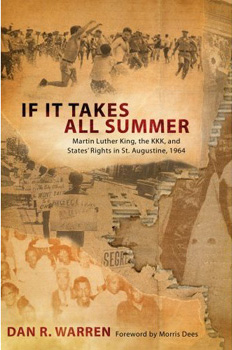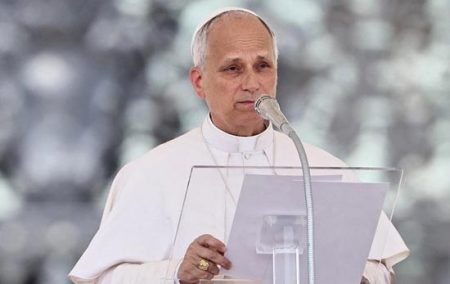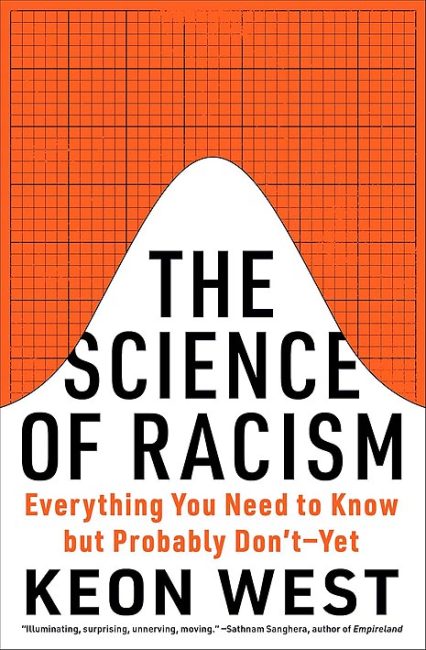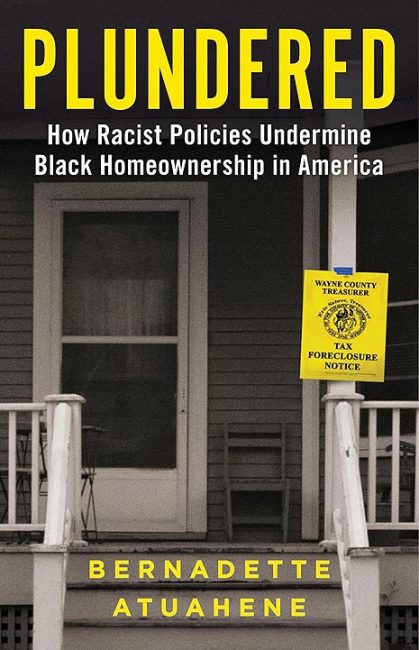If It Takes All Summer: Martin Luther King, the KKK, and States’ Rights in St. Augustine, 1964
 Written by Dan R. Warren, foreword by Morris Dees.
Written by Dan R. Warren, foreword by Morris Dees.
Published by the University of Alabama Press, 2008, 210 pages.
Book review by David L. Swain
In his engaging book, “If It Takes All Summer,” author Dan R. Warren recounts the mounting rage within society against racial discrimination, and how he, as a middleman appointed by the governor of Florida, worked within a difficult racial situation in St. Augustine, Florida, to bring inescapable reason and a gutsy morality into the super-heated situation of the summer of 1964.
Founded in 1564 by the Spanish admiral Pedro Menendez de Aviles, the city in 1964 was preparing for its quadricentennial celebration. There was one fatal flaw in the arrangements: no black citizens were included in the planning.
This deliberate exclusion of a major segment of the city’s citizens
doomed the celebration from the start. And that failure impelled Dr.
Martin Luther King, Jr., and his supporters to come (as uninvited
guests) determined to end segregation there. It would also bring the Ku
Klux Klan to the nation’s oldest city. Dan R. Warren, the District
Attorney for north Florida, knew the Klan would be more welcomed by
white citizens than King would.
So, as the city prepared to celebrate its 400th birthday, with
Vice-president Lyndon Johnson scheduled to deliver the keynote address,
no blacks were invited to attend (though Johnson had made it clear that
he would not attend if blacks were left out). But the exclusion of
African Americans brought not only Dr. King but also leaders of the
Southern Christian Leadership Conference (SCLC) to the city, and it
stirred into action the local NAACP chapter, which saw clearly that the
community as a whole was not satisfied with segregation, and thus
sought to make the necessary changes. These leaders produced a report
that judged civil rights conditions in St. Augustine to be
“considerably worse than in most if not all other cities in the state.”
The civil rights proponents faced a group of equally committed
racists, led by Sheriff L. O. Davis and his friend Holstead Manucy,
local leader of the Ku Klux Klan and head of St. Augustine’s Ancient
City Gun Club, which boasted many Klan members.
The real power of the Klan was centered in three men: J. B.
Stoner, an Atlanta lawyer, who believed segregation was essential to
the security of whites; Connie Lynch, a master at fomenting hate; and
Manucy, “a pot-bellied farmer and convicted moon-shiner.” Forida
governor Farris Bryant refused to interfere or even cooperate with the
U.S. Commission on Civil Rights, claiming the crisis was purely local.
That February (1964), the Civil Rights Act had passed in the
House of Representatives by a vote of 290 to 130. Strong support for
the Act came from Mabel Norris Chesley, associate editor of the Daytona
Beach “News-Journal,” from its managing editor, Tippen Davidson, and
from a lawyer named George Allen.
Meanwhile, black citizens marched in the city’s streets during
daytime. Besides support from Martin Luther King, they were joined by
such well-known persons as Jackie Robinson, Sarah Patton Boyles, wife
of a University of Virginia professor, and William England, a chaplain
at Boston University, among others. Local church leaders remained
silent.
In the end, though, District Attorney Warren won, and for his
efforts was invited to speak in February 1965 to the combined faculties
of law and theology of Boston University, where Dr. King had earned his
doctorate of theology.
Warren’s lecture stressed the key lesson
of the struggle in St. Augustine: the racial struggle in St. Augustine
and its resolution by ethically motivated persons in the churches, the
courts, the public media and schools, and elsewhere underscored a basic
truth of the evil that can happen when good people of conscience fail
to act.
That it took nearly two hundred years for blacks to obtain the
same rights enjoyed by the original patriots demonstrates this truth so
painfully. Or as the Jewish philosopher put it: “The opposite of faith
is not heresy; it’s indifference. And the opposite of life is not
death; it’s indifference.” Warren sums it up thusly: “It was
indifference (on the part of politicians, community leaders, churchmen,
ordinary men and women (that allowed the Klan to step into the
limelight and carry out its agenda of hate and brutality.”
And that brings us to the final words of Warren’s book, namely,
Edmund Burke’s dictum: “The only thing necessary for the triumph of
evil is for good men to do nothing.”








